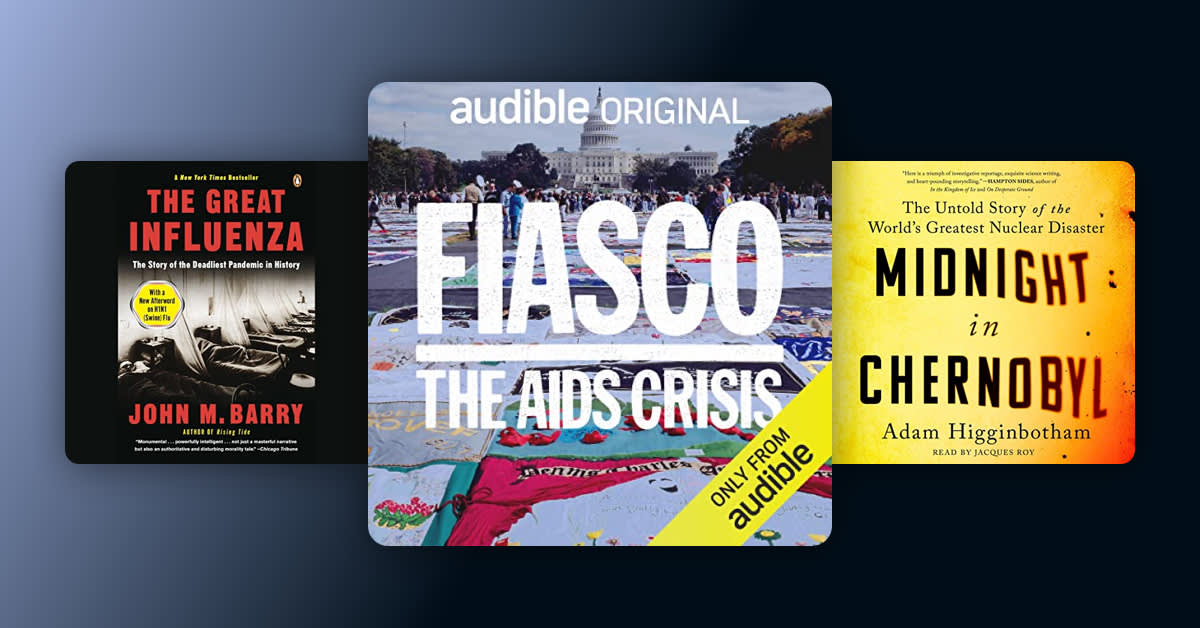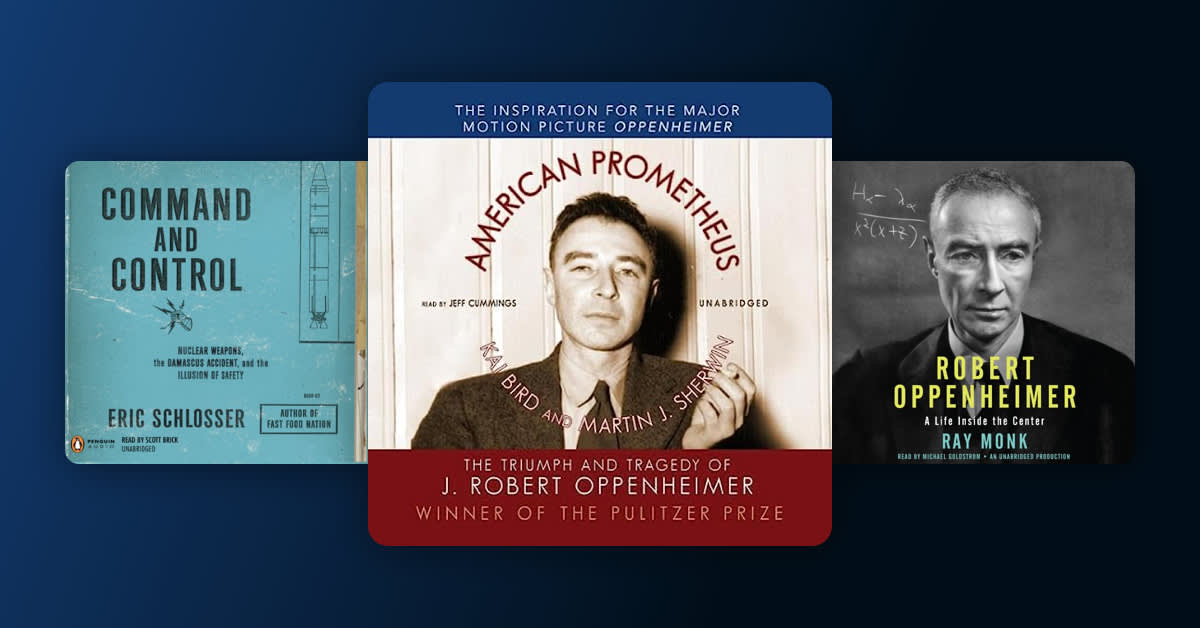At the intersection of dark history and narrative nonfiction sits the surprisingly fertile microgenre of disaster nonfiction. Often incorporating the action of a thriller, the tick-tock of a procedural, and even the dystopian elements of sci-fi, these heart-stopping narratives are all the more fascinating (and educational) for being true. From cataclysmic weather events and historic pandemics to human-made catastrophes of all kinds, these are 16 of the best nonfiction accounts of history-making disasters.
Save this list to your Library collections.
3, 2, 1... Once you start Nuclear War: A Scenario, the countdown begins. If you’re like me, you will RACE to the finish of Annie Jacobsen’s shocking and deeply researched, self-narrated work, which posits a scarily realistic scenario for nuclear war—a threat the Pulitzer-nominated author says we have essentially repressed because of the totality of catastrophe and the pure insanity of our vulnerability to it. Destined to become a classic of disaster nonfiction, Nuclear War deals with another level of urgency and scale than most. As entertainment, it’s utterly engaging. As nonfiction, I hope it succeeds as a PSA and wake-up call the world needs to hear.
Journalist Adam Higginbotham lays out in dramatic detail the definitive story of the Chernobyl nuclear power plant disaster, based on original reporting, exclusive interviews, and archival research. Narrator Jacques Roy gives a pitch-perfect performance, and as one listener says, "he handles the Russian vocabulary with ease."
From bestselling author Daniel James Brown (The Boys in the Boat) comes this deeply researched and engrossing account of one of history's worst ordeals: the blood-chilling saga of the Donner Party. When a wagon train of multiple families set out for California in April of 1846, their dreams of a better life were quickly transformed into a nightmare of heavy snows, closed mountain passes, and hardships so unfathomable, they were forever mythologized in American lore.
From Slow Burn co-creator and acclaimed journalist Leon Neyfakh comes this eight-part history of the AIDS crisis, a narrative podcast that transports listeners into the day-to-day reality of one of America’s most pivotal historical events. Named a best podcast of 2022 by The New Yorker, Variety, and Mashable, Fiasco was also selected as Audible's Best of the Year in Nonfiction.
First published more than 50 years ago, David McCullough's remarkable history, The Johnstown Flood, remains the definitive account of the epic 1889 failure of an earth dam above Johnstown, Pennsylvania, which killed more than 2,000 people and became a national scandal. Edward Herrmann's narration is the perfect pairing for this nonfiction classic, with one listener calling it "the best of the best."
Garrett M. Graff's Audie Award-winning oral history of September 11, 2001 is not only a gripping, comprehensive account of one of the world's most infamous terror attacks. It's also a singular audio experience—a panoramic narrative woven from the voices of Americans, including first responders, eyewitnesses, and survivors.
Magisterial in its breadth of perspective and depth of research, John M. Barry's The Great Influenza is a legendary account of the devastating 1918 flu, the most severe pandemic in recent history. With thrilling yet sensitive narration by acclaimed performer Scott Brick, this masterpiece of medical history is an all-time must-listen.
This claustrophobic account of an underwater disaster—the story of five divers on a cleanup mission in a 10-mile tunnel under Boston harbor—listens like an action-packed thriller, though with rich and sensitive reporting. One listener calls it "one of the most addictive and fascinating true stories" they've encountered, with excellent narration to match.
This award-winning Audible Original podcast, co-presented by a former Australian naval officer who worked on the search, investigates the baffling case of a Boeing 777 commercial jet that disappeared en route from Malaysia to Beijing in 2014, with 239 people on board.
Dorsey Armstrong's 24-lesson course on the Black Death is one of The Great Courses's most popular listens, and it's not hard to understand why. Despite being well-known as a catastrophic event of the medieval world, this legendarily gruesome outbreak was, as Professor Armstrong makes clear, the most significant event in Western history.
This Pulitzer Prize-winning work tells of the tragic patient deaths that took place at Memorial Medical Center in New Orleans when Hurricane Katrina hit. After the storm knocked out the hospital's utilities, caregivers were forced to make increasingly difficult decisions—some of which, as survivors would later allege, resulted in the premature deaths of critically ill patients. Sheri Fink's balanced writing combined with Kirsten Potter’s well-practiced tone present the facts without bias, allowing listeners to decide for themselves where they stand on the issues Five Days at Memorial raises.
This outlandish, terrifying, and often hilarious audiobook tells the story of New Jersey's legendarily dangerous amusement destination, notoriously nicknamed "Class Action Park," where millions were entertained and almost as many bruises were sustained.
Go behind the blockbuster Oppenheimer with the Pulitzer Prize-winning biography that inspired the film. Kai Bird's epic profile of J. Robert Oppenheimer, American Prometheus is an intimate portrait of the brilliant physicist who led the development of the atomic bomb and confronted its moral consequences.
The ordeal of the whaleship Essex was as mythic in the 19th century as the sinking of the Titanic was in the 20th. Nathaniel Philbrick's harrowing account of the 1819 disaster—which left 20 crew members adrift the South Pacific, succumbing to weather, hunger, disease, and worse for more than 90 days—is an epic yarn of maritime history and a blistering testament the fight for survival.
Considered the world's worst industrial disaster, the Bhopal Tragedy
resulted from a 1984 chemical accident at a pesticide plant in Bhopal, India, that exposed half a million people in the surrounding small towns to a highly toxic gas. This episode of the podcast Engineering Misjudgment is a brief but well-researched examination of the event from a host with a chemical engineering background.
OK, this one is not terrifying, but it deserves a spot on this list for its hilarious account of a moviemaking catastrophe turned happy accident. Among the best worst films ever made, The Room has developed a cult following in the years since its spectacular flop. In this insider account of its production, actor Greg Sestero (who portrayed the film's infamous character Mark) lets listeners in on the secrets of the cult film and the eccentric impresario behind it all, the screenwriter, producer, director, and actor Tommy Wiseau.




















